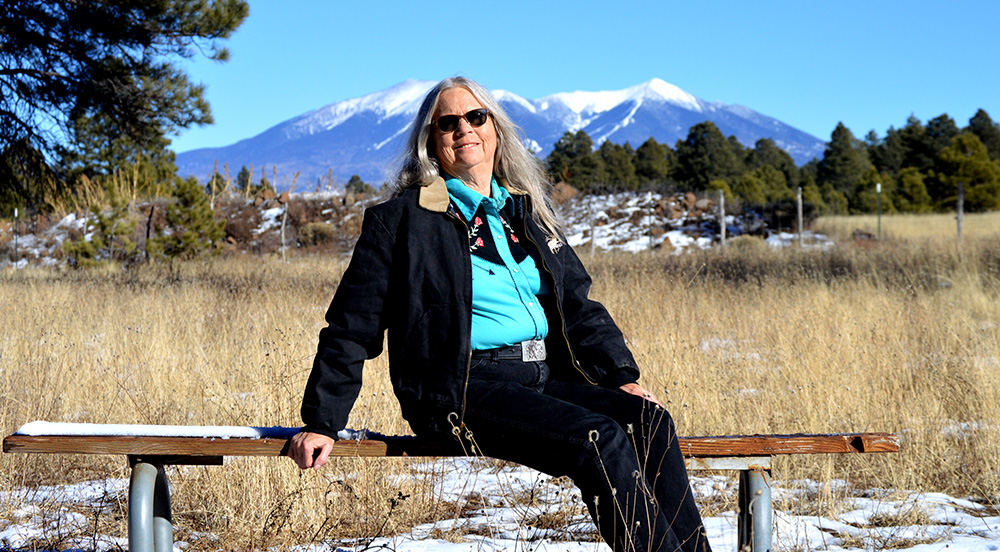Thanks to her laser focus, Denise Dean has risen to the top of her profession. She admires RMEF for doing the same thing.
by Noah Davis
“The why of going hunting is more important to me than getting the animal,” Life Member Denise Dean says as she remembers a past hunt.
While Denise and her late husband Patrick Hatch typically applied for cow tags in the mountains near their home in Flagstaff, Arizona, one year they were lucky enough to receive a bull tag.
“We were sitting in a draw before daylight, waiting to see if anything would come down. Patrick and I were in the open next to some trees. No blind, just camo.” She pauses as if chewing on the memory.
“We started to see elk. A line of them. Fifteen cows made their way toward us, and we hoped a bull would be with them. Pretty soon they were within feet of us and bedding down to chew their cud. The wind must’ve been perfect. This went on for 20 minutes, which was just the most incredible thing. When we finally moved, they saw us and all 15 whipped around with a ‘What the hell!’ look. We could’ve almost touched them before they took off.”
Like so many hunters who admire wild country and creatures, Denise believes these moments are what keep pulling her back.
Yet even though she grew up bouncing around the West, she didn’t actually start hunting until RMEF introduced her to it at age 40.
Though she hunts close to home, she travels far. Denise is a renowned breeder of Bernese Mountain Dogs and a rare French herding breed, the Berger Picard. A judge at dog shows across the country and internationally, she’s an expert in nearly 150 different breeds. But when she’s not hopscotching across the world showing or judging canines, Denise focuses on the slice of heaven that is northern Arizona, and the elk country she and Hatch hunted together.
“We only ever wanted to hunt for meat, so we mostly applied for cow tags. Luckily, we didn’t have to wait long to draw so we could go hunting.” Denise and Hatch learned the blue-collar way: self-guided in local country, gaining experience as they went.
“Between the two of us we killed around a dozen cows. I drew a great mule deer tag in 2015 on the north rim of the Grand Canyon a year after Hatch passed. It was an incredible animal in incredible country. The only animal I ever killed with antlers!”
Denise found the Rocky Mountain Elk Foundation before she started hunting. The local Flagstaff Chapter was one of RMEF’s first to take root back in the 1980s, which is when Denise attended her first banquet. Immediately she was hooked on the atmosphere, mission and community. “It was the people and energy around hunting that really made me take the plunge into hunting myself.”
But one of her most formative moments as a member of the organization occurred at an Elk Camp in 2004 when RMEF was busy fundraising for its new headquarters in Missoula, Montana. “They announced that every dollar was going straight to the building, and it did! That really inspired me, and it showed me that they put their money where they say they will.”
Denise believed that the new headquarters was the springboard RMEF needed to begin its next big chapter conserving elk country, and now almost 20 years later, she’s seen how much the organization has grown and been able to do more than ever.
RMEF ’s knack for putting its money to good use also motivated Denise to complete a charitable gift annuity to further her donations. This has multiple benefits, providing her an immediate tax deduction while also creating a retirement income stream for later in her life and directly benefiting elk and elk country in the meantime.
Dean’s giving also makes her eligible for the Trails Society. Trails Society members receive a Trails Society pin, their name listed in a recognition kiosk at RMEF’s Elk Country Visitor Center in Missoula, Montana and invitations to exclusive activities.
“I give because I admire the mission of the Rocky Mountain Elk Foundation,” says Dean. “I’m lucky where I live. Only five percent of the county surrounding Flagstaff is privately owned. All the rest is national forest or BLM, so we don’t have issues with access. But I know there are places where that isn’t the case, and we need to have accessible land for the public. While I’m a hunter, I like that it’s not just about hunting. We need to conserve land for all different species and people. I really appreciate that RMEF has stayed focused on its mission.”
